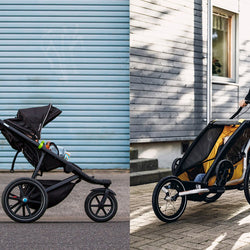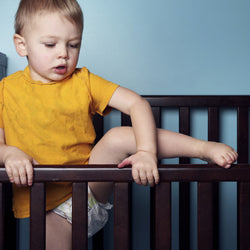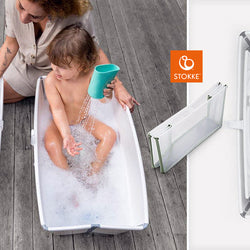Learning the ABCs from Birth

by Jeff & Annie Wiesman
Aug 11, 2018
As you naturally bond with your new little addition, your infant is beginning to develop language abilities. By simply talking to your baby as she coos and babbles, you are introducing sounds that will later be blended into words. Converse, read, and interact with your newborn and you will put her on the path to learning the ABCs.
You can easily engage her by:
- Commenting on what you (and Baby) see around you.
- Describing your daily activities.
- Speaking about familiar people, things, places, events, and experiences.
- Sharing stories about your own life, or of friends and family.
Do these things at birth, and then starting at around three months old, your baby will be increasingly sensitive to speech sounds. She is able to actively listen to your voice and watch your face as you talk. She will turn towards voices and take in sound and tone.
At about four months old, she will begin to utter her own sounds such as “goo-goo” or “gaga” and include more consonant sounds. At around nine months of age, your little ones will begin to understand basic words such as “mama” or “no.” And at around a year old, they will likely say and understand their first words.
Article Continues Below Advertisement
Intentional Reading
Now that you understand what is happening during each developmental stage, continue to introduce language through books. Board and plastic books with one word and a matching picture are a great place to start. As you teach your child what a cat looks like and point to the word cat, her brain is making the connection to be drawn upon later.
We read to our daughter frequently, and we are convinced that her love of literature was formed at an early age as a result. While books become chew toys more often than not during infancy, the textured pages, squeaky sounds, and bright colors will build interest in reading.
Book ideas:
- Peekaboo by Melissa & Doug
- Bright Baby First Words
- Sassy Baby’s First Books
- DK Squeaky Baby Bath: (various titles: Things That Go, Baby Animals, Colors)
- Manhattan Toy Soft Activity Book with Tethered Toy (various titles: Sunny Day, Buzzing Through)
Language Rich Interactions
At about four to six months old, your baby will begin to learn how to grasp and play with objects and toys. During play time, you will promote early language development if you sit alongside your little one and talk about what you are doing. You will expose her to many words, and when she is able to speak, she will try to imitate the words you say.
Article Continues Below Advertisement
At this same age, your baby will increase interactions with caregivers with games like pat-a-cake and peek-a-boo, and she begins to learn the give and take of a regular conversation. By twelve months of age, according to child psychologist Laura Berk, children “practice the turn-taking pattern of human conversation, which is a vital context for acquiring language skills.”
Constantly communicate and interact with your newborn. The more words she hears in the early months and years, the better prepared she will be for preschool and kindergarten. In fact, pediatric professor Dr. Dana Suskind determined that some children hear 30 million fewer words than others in the early years.
Those who hear fewer words often start and stay behind in school. Conversely, children who hear more words have a better vocabulary, are better readers, and earn higher test scores in elementary school later in life.
Article Continues Below Advertisement
So as soon as your child is born, create a culture that values language development. Interact with your newborn. Make it a point to talk to your infant as often as possible and she will absorb so much.
Jeff & Annie Wiesman
Dr. Jeff & Annie Wiesman are coauthors of “Education Begins at Birth: A Parent’s Guide to Preparing Infants, Toddlers, and Preschoolers for Kindergarten.” Jeff is an associate professor of education who mentors future elementary school teachers, and Annie has numerous years of experience teaching preschool, kindergarten, and first grade. They reside in New York with their five-year-old daughter.










